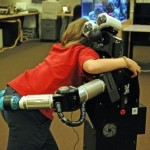 AI may be many things, but it’s perhaps rare to find many examples where it enhances our ability to empathize with others. In The Feeling Economy: How Artificial Intelligence Is Creating the Era of Empathy, however, the University of Maryland’s Roland Rust argues that AI is actually helping to bolster skills such as emotional intelligence.
AI may be many things, but it’s perhaps rare to find many examples where it enhances our ability to empathize with others. In The Feeling Economy: How Artificial Intelligence Is Creating the Era of Empathy, however, the University of Maryland’s Roland Rust argues that AI is actually helping to bolster skills such as emotional intelligence.
“Ironically, as AI is becoming more able to think, human intelligence is deemphasizing thinking in favor of feeling and interpersonal relationships,” he argues.
The book chronicles the ongoing developments in AI and examines how society can function when AI and human intelligence begin to collaborate more closely together.
“This involves AI doing more of the ‘brain’ work and humans handling the ‘heart’ work, including social interaction, emotion recognition, nuanced communication and genuine care for customers,” the authors explain.
The “feeling economy”
We’re entering what the authors refer to as “the feeling economy”, which they suggest will result in women being more important than ever before, both in business and society. It will also highlight the importance of empathy and less importance being placed on rational thinking, with this shift particularly pronounced in politics.
The book leans heavily on research conducted by the authors for the California Management Review in 2019, which highlighted the shift towards feeling tasks, which the authors believe provides a signal that our transition towards the Feeling Economy is under way.
“Knowledge workers should prepare now for the coming reality: As AI evolves to handle much of the thinking required in fields from manufacturing to retail to healthcare, humans will need to recalibrate and capitalize on strengths beyond pure intelligence–like intuition, empathy, creativity, emotion and people skills,” they explain.
It’s a situation that the authors believe will provide a distinct advantage to women, and the book provides a number of strategies to help women rise to the top in their field. These strategies revolve around utilizing the soft skills and people-oriented strengths that the researchers believe women have advantages in.
“The advance of thinking AI is changing consumers–from their product expectations to their everyday life–we explain how to tailor sales, marketing, and service to meet the needs of emotionally-driven buyers,” they conclude.